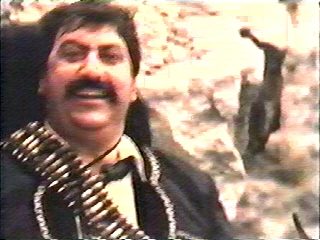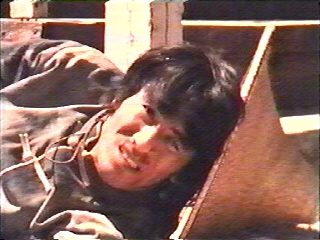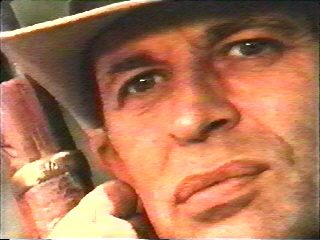
|
|
|
|
|
|
|
|
|
|
|
|
|
(1972) (a.k.a. Shanghai Joe & My Name Is Shanghai Joe & To Kill Or Die) Director: Mario
Caiano
Although there had been a number of European westerns made in the decades before A Fistful Of Dollars was made in 1964, it was undeniably that movie that properly kicked of the spaghetti western craze. This craze actually lasted for a period of time longer than other cinematic crazes; it was in fact only around 1975 when the craze was considered officially dead, though a small number still got made and released over the next few years (including the legendary Keoma.) What makes this longevity of the spaghetti western even more extraordinary is that it managed to continue for several years after the turn of the decade; by that time, signs of stagnation were starting to form on the genre, after the same basic stories and themes had been repeated endlessly. The temporary reprieve came from the addition of elements you wouldn't ordinarily associate with spaghetti westerns. For example, one spaghetti western had children playing almost all the roles. However, the most popular new element added to the genre was comedy, with originated when filmmakers were inspired by the big success of Terence Hill and Bud Spencer's They Call Me Trinity. One other new element filmmakers sometimes added to
spaghetti westerns was the addition of Asian culture. More
specifically, Asian culture tied with the martial arts. Charles Bronson
teamed with samurai Toshiro Mifune The strange thing is that despite the wildly and constantly changing tone of The Fighting Fists Of Shanghai Joe, as well as the factor of the addition of several other problems, it manages to defy the odds and still end up being quite entertaining to watch. For one thing, it doesn't take long for the movie to set things up and get down to business. In San Francisco of 1882, Chen Lee's character (the "Joe" part of "Shanghai Joe" is never explained) arrives from China with dreams of opportunity and making a fortune. Also having dreams of becoming a cowboy, and hearing that Texas is full of them, he decides to book passage on the next stagecoach headed there. Unfortunately, almost as soon as he exits Chinatown and enters the Caucasian district to get his ticket, he discovers that 98% of Caucasian Americans are thoroughly racist assholes, and half of that remaining 2% regard Asians in a way that could be best described as a notch or two more polite. Naturally, this causes unending grief for Joe, from not being allowed to ride in the interior of the stagecoach to ranch hands who refuse to pay up when Joe wins a bet he makes with them. Though if all this ever gets too much for Joe, he has a way to deal with it - namely, thoroughly beating the crap out of the jerks who antagonize him. It doesn't take too many beatings for the legend of Joe to spread around Texas, and he soon finds himself recruited by rich rancher Stanley Spencer. Though when Joe quickly finds out Spencer is cruelly exploiting Mexicans as cheap labor, Joe rebels and vows to stop Spencer one way or another. Realizing what he's up against, Spencer in turn gives out the call to a colorful number of bounty hunters... Yep, essentially what we have here is another example of the familiar plot of the little guy defying and fighting the big guy against all odds. Though the "little guy" this time around is substantially different from the norm, western or not. For one thing, we never learn that much about Shanghai Joe; his motives are never revealed, and we don't learn anything about his past until a flashback near the very end, though it proves to be too little and too late. I realize that one of the typical conventions of the western is "The man with no name", a mysterious person with a mysterious past. But when you make a movie where someone is fighting for something for a purpose that's stronger than mere greed, you have to give enough explanation for why he's doing that. Otherwise, the audience will wonder why the protagonist is going through all that trouble and placing himself in danger. Why does Shanghai Joe go to all this trouble to help people he's just met, risking his life in the process? We are never given any kind of explanation. The movie suffers from having a protagonist with
such a bland personality, though it doesn't just come from inadequate
screenwriting. Knowing the context of The rest of the bounty hunters aren't anywhere as memorable. One goes out of the room to have sex with a woman and is never seen or mentioned again, and another one nicknamed "Cannibal" because he has the habit of eating his victims(!) appears for a minute to slobber around and make threats before being quickly dispatched. As for Stanley Spencer, he may be the most disappointing character in the movie. Though he's supposed to be a ruthless land baron who has the entire area under his thumb, there's little presented here that can adequately support that. He doesn't appear that many times, and only briefly each time. He prefers not only to have other people do his dirty work work for him, but to decide just what kind of dirty work to be done. Maybe we shouldn't be so surprised that by the end of the movie he's been simply forgotten by everyone; once the last henchman is dealt with, Shanghai Joe believes his work here is done. I could go on for some time listing criticisms about Shanghai Joe. For example, the musical score is hardly original; 99% of it is simply the recycling of Bruno Nicolai's score for Have A Good Funeral My Friend... Sartana Will Pay. It is doubtful that you have ever heard of director Caiano before (except maybe from the movie Nazi Love Camp 27), and the answer to that can possibly be seen from the style of his direction here. Some bits, like when Shanghai Joe falls in a pit, are so confusingly shot it takes a few seconds after the fact to realize what just happened. (The pan-and-scan format of the version I watched may share some of this blame, however.) Caiano doesn't seem to be terribly interested in adding any kind of personal touch, one notable exception being the sequence when Kinski's character first attacks Shanghai Joe, filmed in an arty slow-motion style that is not only just plain weird but comes out of nowhere. The only other time when Caiano seems inspired is at any moment that seems to call out for bloodshed. Though he doesn't settle for a mere trickle; instead, he gives us arms broken so badly they are practically amputated, gunshots that spit out geysers of blood, and eyeballs ripped out and thrust into the camera lens. It's quite a jolt when this bloodshed happens, coming out of a tone that's otherwise alternately light-hearted and sedate. It might not have been so jarring had there been a sense of urgency and danger throughout the movie, essential for a movie concerning a hero who is pretty much alone and has a number of professional assassins after him. Yes, I could go on for some time listing even more
criticisms, but I won't. I don't have the heart to do so because darn
it, I'll admit it, I really enjoyed Shanghai Joe faults
and all. It's sloppy and uneven, yes, but sometimes you can get extra
enjoyment out of a movie that makes certain kinds Aside from those occasional bursts of graphic violence, this is a wonderfully silly movie. The story may both take a long time to properly set up the conflict and go through each necessary plot turn to get to the climax and resolution (that is, if you can call the failure to deal with the ringleader a "resolution"), but I never found the long and meandering journey to be boring at any point. Though your personal taste might dictate otherwise, the guilty scenes will probably be of little aggravation, since no scene in the movie lasts for more than a few minutes. Even if a scene proves to not advance the story in the very least, there is always something amusing on display. It could be anything, from Shanghai Joe screaming "AYYYYYYY" to strike fear in his opponents but instead reminding you of Fonzie, to the director momentarily breaking away from the story (for no conceivable reason) to focus on a group of women complaining that they want to be satisfied in the bedroom as much as their husbands. The Fighting Fists Of Shanghai Joe is so much fun that I didn't question things like when Shanghai Joe is forced to fight a bull in a ring why he doesn't just duck behind one of those safety barriers around the perimeter - the fight itself was goofy enough to be entertaining. Oh, and that two year-old recycled musical score? It still kicks ass, as much as the rest of the movie does on its own.
Check for availability on Amazon (VHS) See also: Bloodfist 3, Cheyenne Warrior, If You Meet Sartana... |
 in Red Sun, and Lee
Van Cleef teamed up with Lo Lieh in The Stranger And The
Gunfighter. On the other hand, there was Klaus Kinski battling
against Chen Lee in The Fighting Fists Of Shanghai Joe.
Not only is this (noodle?) western different from those previously
mentioned ones with the fact the Asian and Caucasian stars are made as
adversaries, its tone is also remarkably different. Although Red
Sun both played it straight alternately with
touches of comic relief, and Stranger was a
tongue-in-cheek caper with the addition of gunplay and martial arts,
Shanghai Joe still seems positively schizophrenic by
comparison. It also has comedy, but these attempts at humor feel very
out of touch in a story that not only finds the protagonist constantly
struggling against one of the major ills of human society - racism - as
well as against homicidal individuals who want to kill him in the worst
way. The protagonist's methods of getting out of his predicaments are
equally two-sided; sometimes our hero dispatches his enemies in the
most light-hearted of ways, with an almost dance in his steps and/or
leaving his defeated opponents thoroughly humiliated. Yet there are
other times when he violently shatters the bones and inflicts extremely
bloody wounds on those opponents. It's kind of hard to laugh when that
happens, or even when it's a memory from a previous scene.
in Red Sun, and Lee
Van Cleef teamed up with Lo Lieh in The Stranger And The
Gunfighter. On the other hand, there was Klaus Kinski battling
against Chen Lee in The Fighting Fists Of Shanghai Joe.
Not only is this (noodle?) western different from those previously
mentioned ones with the fact the Asian and Caucasian stars are made as
adversaries, its tone is also remarkably different. Although Red
Sun both played it straight alternately with
touches of comic relief, and Stranger was a
tongue-in-cheek caper with the addition of gunplay and martial arts,
Shanghai Joe still seems positively schizophrenic by
comparison. It also has comedy, but these attempts at humor feel very
out of touch in a story that not only finds the protagonist constantly
struggling against one of the major ills of human society - racism - as
well as against homicidal individuals who want to kill him in the worst
way. The protagonist's methods of getting out of his predicaments are
equally two-sided; sometimes our hero dispatches his enemies in the
most light-hearted of ways, with an almost dance in his steps and/or
leaving his defeated opponents thoroughly humiliated. Yet there are
other times when he violently shatters the bones and inflicts extremely
bloody wounds on those opponents. It's kind of hard to laugh when that
happens, or even when it's a memory from a previous scene. Shanghai Joe,
actor Chen Lee seems a very odd choice to play the title role. He just
goes through the motions, not putting any real energy or passion in any
particular scene, and his facial features suggest a Caucasian
background as much as an Asian one. When you also consider that Lee's
limited acting credits are all for Italian films, it seems even more
likely he was an Italian citizen and was hired for convenience's sake.
Equally disappointing in their construction are the characters of
Stanley Spencer and the bounty hunters he hires. Despite his prominent
billing, Kinski actually does not play the chief role of Spencer;
instead he plays the role of the bounty hunter with a penchant for
scalping his victims, a role so brief that it doesn't even earn the
moniker of "extended cameo". Still, I guess the producers got their
money's worth, not just because they only had to pay Kinski a fraction
of his usual fee, but that Kinski still decided to ham it up in his
usual classic way that fans will be familiar with from movies like
Shanghai Joe,
actor Chen Lee seems a very odd choice to play the title role. He just
goes through the motions, not putting any real energy or passion in any
particular scene, and his facial features suggest a Caucasian
background as much as an Asian one. When you also consider that Lee's
limited acting credits are all for Italian films, it seems even more
likely he was an Italian citizen and was hired for convenience's sake.
Equally disappointing in their construction are the characters of
Stanley Spencer and the bounty hunters he hires. Despite his prominent
billing, Kinski actually does not play the chief role of Spencer;
instead he plays the role of the bounty hunter with a penchant for
scalping his victims, a role so brief that it doesn't even earn the
moniker of "extended cameo". Still, I guess the producers got their
money's worth, not just because they only had to pay Kinski a fraction
of his usual fee, but that Kinski still decided to ham it up in his
usual classic way that fans will be familiar with from movies like  of mistakes, or has
scenes that were intended to be serious but come across as goofy
instead. These kind of attitude can be found in the key selling feature
of the movie, the fight sequences. Before I go into detail about that,
I first must point out that for the most part the fight sequences are
not so silly. In fact, some of them really deliver the goods, the best
being the moment when Shanghai Joe jumps a bunch of waiting gunfighters
in a saloon. The fights are "old school" style, akin to the slower and
more deliberate moves found in Hong Kong movies of the 1970s, but
though the action might not be as swift, the impact of every blow has
been heightened. At the same time, the goofier touches found in older
Hong Kong martial arts movies can be found amidst the furniture and
limb breaking. This includes (but is by no means limited to) Shanghai
Joe leaping great distances in the air thanks to off-screen
trampolines, footage being shown in reverse to make him appear he can
leap even higher in the air at certain points, and multiple cuts that
give the impression he can make several somersaults in the air from
springing up from ground level - one time being when he's lying on
the ground instead of having both feet firmly planted there.
of mistakes, or has
scenes that were intended to be serious but come across as goofy
instead. These kind of attitude can be found in the key selling feature
of the movie, the fight sequences. Before I go into detail about that,
I first must point out that for the most part the fight sequences are
not so silly. In fact, some of them really deliver the goods, the best
being the moment when Shanghai Joe jumps a bunch of waiting gunfighters
in a saloon. The fights are "old school" style, akin to the slower and
more deliberate moves found in Hong Kong movies of the 1970s, but
though the action might not be as swift, the impact of every blow has
been heightened. At the same time, the goofier touches found in older
Hong Kong martial arts movies can be found amidst the furniture and
limb breaking. This includes (but is by no means limited to) Shanghai
Joe leaping great distances in the air thanks to off-screen
trampolines, footage being shown in reverse to make him appear he can
leap even higher in the air at certain points, and multiple cuts that
give the impression he can make several somersaults in the air from
springing up from ground level - one time being when he's lying on
the ground instead of having both feet firmly planted there.